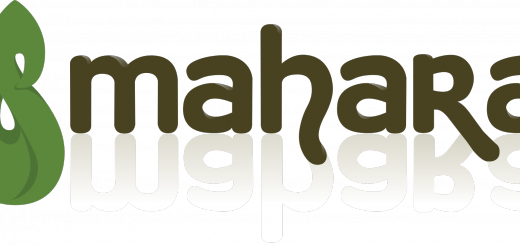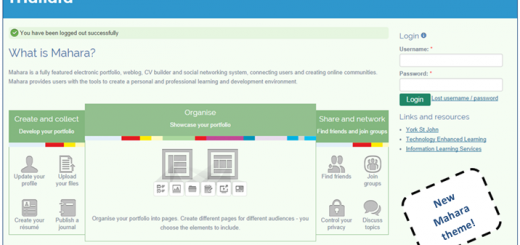Mahara UK Conference 2013
This years Mahara UK conference was a 2-day programme and took place on 4th and 5th July 2013. Annette Webb and I, along with other users and practitioners of Mahara, gathered this year at The Custard Factory in Birmingham (which isn’t as awesome as it sounds) for a series of presentations and workshops.
Day 1
Keynote Speaker – e-Portfolios with Competence – Simon Grant (CETIS)
Simons keynote address focussed on the work he has been doing as part of the InLOC specification – a framework, or information model, for representing both learning outcomes and competences. InLOC allows descriptions of learning outcomes and competences to be managed and exchanged, and enables services that guide people to and through learning into employment. It supports mobility by enabling links to be made between information about a learner’s capability, employers’ requirements and intended outcomes of learning opportunities. I think the idea, in principle, is an excellent one, but it could be some time before we see such a standard in operation across the sector.
Mahara Course Management – Leon Van Den Broecke (Access to Music)
Leon presented his Course Management, resource and teaching systems on Mahara. He was accompanied by Richard & Scott, two of his learners. These learners were Level 3 music practitioner students and have submitted and managed their assessments entirely through Mahara this year. They also manage a promotions enterprise through a Mahara portfolio. Leons students demonstrated some excellent work, and talked about how easy they found Mahara to use when developing their portfolios. This was a good example of students developing digital literacy skills that would serve them well in the future.
Incorporating Digital Literacies into an embedded employability skills development programme – Nitin Parmar & Louise Oliver (University of Bath)
Nitin & Louise talked about their work in developing, and delivering, an employability skills development programme at the University of Bath. The programme uses Mahara as a key component in supporting undergraduates through building, and reflecting upon, employability skills development within a range of activities. This was an excellent presentation, probably the highlight of the conference for me (sorry Annette), and is something that I could see working very well here at YSJ!
Designing effective assessments that use Mahara – Samantha Moss (Southampton Solent University)
Samantha gave the audience some ideas of how to write assessments that utilise the major functions in Mahara, focussing on Personal Development Planning and Employability. Examples of Southampton Solent University assessment briefs, submission mechanisms and live assignments were used as examples, we heard about some of the ‘lessons learned’, and other bits of information that were useful reminders. Mahara is such a huge, varied and flexible tool, it sometimes gets complicated for lecturers to pin-point how exactly they’d like their students to use it for summative assessment. This was a great reminder about how important it is to set clear and definitive assessment guidelines, and to have a sound pedagogical purpose for carrying out assessment in Mahara. This presentation also provided the quote of the conference for me…
“Don’t let the technological tail wag the pedagogical dog.”
http://academia.edu/3889198/Designing_Effective_Assessments_with_Mahara
Keynote Speaker – State of the Mahara Nation – Don Christie (Catalyst NZ)
Don gave a great presentation reflecting on the history of Mahara, the current state of Mahara worldwide, and the future roadmap for Mahara developments. There are some interesting new features planned for 1.8 & 1.9, including universal search, skins, Open Badges integration, flexible page layouts (rows/columns), and general user interface improvements.
Mahara: creative spaces – Teresa MacKinnon (University of Warwick)
Teresa talked about how The Language Centre, at the University of Warwick, has deployed Mahara to facilitate student reflection and presentation skills. During their advanced level language learning, nearly 200 students over 2 years have been able to capture their learning journey in order to analyse and reflect upon the approaches that are most effective in supporting their language acquisition. Their narratives offer teaching staff a window into the processes they undertake, giving staff an opportunity to learn from their students. This presentation was really interesting, as it demonstrated very similar outcomes to the work that has been done in Languages here at YSJ. Their case study is an interesting one, and can be read online at: http://www.scribd.com/doc/133421941/E-portfolio-Project-Case-Study
Mahara Suites – Exploring a Multiple Institution Model – Don Presant (Learning Agents)
Don outlined some of the history and thinking behind multiple institution Maharas and lead a discussion on where things might be headed. Multiple institutions (a technical term in Mahara, not to be confused with ‘HE institutions’ for example), are something that we have been exploring as a means of providing on-going access to Mahara portfolios to postgraduates/alumni as part of their on-going CPD and employability development.
Lessons learnt – Using Mahara for the PGCE Programme – Anna Holloway (Newman University)
Anna reflected upon some of the challenges face, and lessons learnt, when implementing Mahara for use with PGCE students at Newman University. Anna was also discussed the support they provided to enable students to use the e-portfolio tool effectively.
Day 2
Becoming a Mahara contributor the non-technical way – Kristina Hoeppner (Catalyst NZ)
Kristina started day 2 with something of a ‘call to action’ – reminding us that contributing to an open source software project is not only about technical contributions, such as coding, but it is also very much about other things. Users’ needs have to be understood, requirements specified, funds raised, training provided, and the platform made exciting and fresh. In her presentation she provided some ideas of how everyone can get involved in contributing to the project in many ways in order to make a difference.
Pimp my portfolio legally (Pecha Kucha) – Kristina Hoeppner (Catalyst NZ)
Kristina also delivered a very good Pecha Kucha presentation on how to pimp your portfolio using Creative Commons licensed images and content.
Mahara help area for users at Forth Valley College – Jasmin Hodge (Forth Valley College)
Jasmin gave an informative presentation on how they had used Mahara to provide help and support resources for their students: http://moodle.forthvalley.ac.uk/mahara/view/view.php?t=SEq6fBIU5VodsZl3r7XM
This is a great example of the flexibility of Mahara, having such resources in Mahara seemed to be quite a consistent theme among users, and is something we are looking to replicate here at YSJ when we upgrade to Mahara 1.7 this summer.
An introduction to Open Badges – Meredith Henson (Catalyst)
Meredith gave a short overview of Open Badges, and generated quite a bit of interest among those who weren’t familiar with the concept.
I’ve written quite a bit about Open Badges recently, so there isn’t much more to say on that for the time being 🙂
Let’s talk about themes and usability – Roger Emery (Southampton Solent University)
Roger led a session where anyone with thoughts about themes/skins/designs/workflows/usability could get together in a room, share ideas and consider a way forward to improving general usability of Mahara.
Southampton Solent University have brainstormed their own ideas. Some are quite straightforward to develop, some less so within the current Mahara architecture. These ideas and mock-ups were used as a starting point to get the conversation going.
Southampton Solent had some great ideas, and are in the process of making some very impressive changes to their Mahara platform. This is something we probably don’t have the time and resource to do to such a great extent, but the TEL team are certainly planning on revamping Mahara, inline with changes to the Moodle theme, once we upgrade to 1.7.
Creation of eSports brand using Mahara within Forth Valley college for inclusive learner and staff engagement – Grant Ralston (Forth Valley College)
Another great presentation from Forth Valley College – Grant talked about how he has used Mahara with his sports students to develop an ‘e-sportfolio’ brand. Students took ownership of their portfolios and produced some exciting and innovative work, particularly in their often-unpopular events management module.
It was great to see another presentation from an academic at the conference, given that most were delivered by Learning Technologists, and his enthusiasm for the Mahara platform was clearly rubbing off on his students. There are similar great examples of students using Mahara here at YSJ, but we could always do with a few more…
“The Blind Men and the Elephant” e-Portfolio use and the bigger picture – Annette Webb (York St John University)
Last, but certainly not least, was Annette, with her presentation on the perception of academics in the use of e-Portfolios in this digital age. Annette shared and recognised some of the challenges faced by academics in using this form of disruptive technology, based on her research, and emphasised the need for a strategy to be in place to ensure the success of utilisation and engagement with e-Portfolios.
Post-Conference Reflections
The conference gave us plenty to think about, but our main priority is to get our system up-to-date, so we can begin to think about re-design, and start exposing our users to some of the new functionality. then we can continue to spread the word about Mahara and get more people on board.
I have collated all of the Tweets and presentations etc. from the event in Storify: http://storify.com/PhilVincent/mahara-uk-2013-conference
Phil


